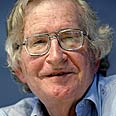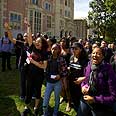

WASHINGTON – Events marking "Israel Apartheid Week" have commenced on campuses all over the world, including in Canada, and to a lesser extent in the United States.
During the course of the week organizers will be distributing material depicting Israel as an apartheid state and call on the international community to impose sanctions against it.
Most of the activity in the US is taking place in New England, including at Boston University and Brown University. On the west coast events will be held at The University of California, Berkeley.
The keynote speaker at the Boston University gathering was Jewish intellectual and political activist Noam Chomsky (82), who called on US citizens to confront Israel over its treatment of the Palestinians.
"Over time, the apparatus of Israeli control has become more sophisticated and effective in affecting Palestinian life,” said Chomsky, a noted author and Massachusetts Institute of Technology professor emeritus. Israel has finally begun to adopt the South African policy of what they call ‘indigenization of repression,’” he said.
Addressing the comparison between Israel and South Africa, Chomsky said, “It’s not exactly like the South African apartheid. In some respects it’s not as bad, but in some respects it’s worse.”
"For decades, Israel has been killing and kidnapping civilians in Lebanon…bringing them to Israel, imprisoning them, keeping them as hostages…but two Israel soldiers are captured at the border (and it) justifies a US invasion,” he said. “It’s a comment of us and what we go along with.”
Chomsky criticized US foreign policy toward Israel but stressed it could also use its power abroad to lessen the Israeli-Palestinian conflict.
“The world works like the mafia,” he said. “There is the don, or us (the United States), and when the don says not do something, you don’t do it.”
'It must be monitored'
Chomsky told Ynet on Wednesday, "What I expect the US and Israel to do is to end their extreme rejectionism and join the overwhelming international consensus on a two-state settlement, along the lines that have been discussed in great detail, in Israel too - e.g., the Geneva proposals.
"Note that I say 'US and Israel,' because, despite pretenses, in the real world they act in tandem: Israel can go as far as the US permits, no farther, and relies on constant and decisive US support and participation," he said.
"As for a 'Jewish state,' that's a separate matter. In principle, I don't like the idea of Christian, white, Islamic, Jewish, etc. states. I think states should be the states of their citizens, and do not agree with the Israeli High Court that Israel should be 'the State of the Jewish people,' in Israel and the Diaspora - that is my state, but not the state of its Palestinian citizens. If that were merely symbolic, it wouldn't matter much. But it's far from that as every Israeli should know. However, that's not an international issue. It's an internal problem for Israelis, much like the failure in the US to implement the 14th amendment after almost 150 years."
Israeli Consul-General in Boston Nadav Tamir said Muslim groups and extreme leftist organizations in the US. "This is a coalition of organizations, some Muslim and some anarchist who have targeted Israel. But I do not believe they have significant influence over American students who are part of the mainstream."
Tamir said Israel's response to "Apartheid Week" is relatively mild "because our polls show that most American decision-makers are graduates of law and business schools.
"Our strategy is to act in places that have an influence and not respond to every provocation," he said.
Anti-Israel activity is not so prevalent in San Francisco either. A Berkeley newspaper made no mention of the protest against Israel. Instead, students were busy demonstrating either against the State of California's intention to raise dorm costs, or against racism toward African-American students on campus.
Israeli Consul General to San Francisco Akiva Tor told Ynet that "anti-Israeli activities are being held in a kind of bubble. It must be monitored; yet there is no cause for alarm. This is not Britain and it is far from the anti-Israel protests I remember as a student during the Lebanon war of 1982," he said.
Tor expressed his satisfaction with the organization of the Jewish and pro-Israel students on the campuses. "They are operating very effectively. The students at Berkeley are preoccupied with other matters," he added.
"Apartheid Week might sound sexy but it did not hold ground. This is not Britain or Canada over here," said a senior Israeli source in the US.















